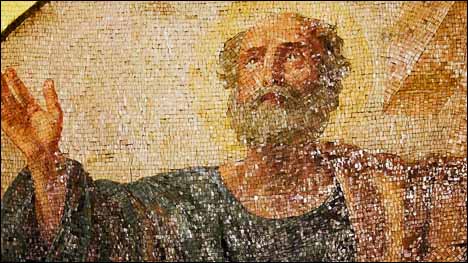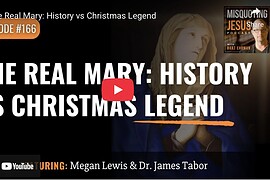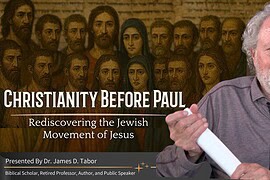The writings and teachings of the apostle Paul are in many ways the bedrock of Christian faith and tradition. But where did Paul get his authority? What does he claim for himself? A number of times in Paul’s letters he uses a technical term in Greek, “to receive,” which is translated from a Greek verb paralambano (παραλαμβάνω) which does indeed often mean to pass on something from one authority to another by tradition (i.e., literally “handed on”). There is a lot at stake here. After all, Christianity, in terms of how it developed beyond the first century, is largely based on Paul -and the ways in which his theological constructs were seen as a kind of final revelatory word of Christ.
I cover this rather thoroughly in my new book, Pauls’s Ascent to Paradise, with a major section on Paul’s understanding of his own apostolic authority and the basis thereof. Paul, more than anyone in history, has affected “all we think about everything”–in both small and greater ways, often unperceived, but operative. Christianity has shaped our entire world for the past fifteen hundred years, and that, primarily takes us back to Paul.

For example, in 1 Corinthians 15, one of the most important chapters for Christian faith in the entire New Testament, Paul writes that he has “received” and then “passed on” (paradidomai) the teaching of that “Christ” (notice he does not say “Jesus”) died for sins, was buried, and was raised the “third day,” and then was seenby various ones–Peter, the Twelve, 500 brothers at once, James (Jesus’ brother), and all the apostles. Most have assumed this means Paul “received” this by some kind of testimony, as if he was told it on a human level, perhaps directly by Peter, or James, or some of the Twelve. That would indeed be a natural and potentially logical reading of Paul’s claims to have “received” this “gospel.”
However, if one begins to examine more carefully just how independently Paul claims to have “received” his message and teachings it becomes clear that he is not in fact getting these ideas, and narratives from sources who were eyewitnesses and thus passed them on to him. Rather he makes the explicit claim that he did not get his “gospel,” which he carefully defines in 1 Cor 15:1, from men, or from any human source, but by a revelation from Jesus Christ himself (Galatians 1:11-12). In fact, he uses the very same verb in these verses, namely, paralambano as he does in 1 Corinthians 15.
So if Paul claims that his “gospel,” of the “death, burial, and resurrection” of Jesus did not come from men, does he intend to say, after all, that he talked to James or to Peter or to John and received from them these testimonies he reports?
This is a very crucial point since many Christians believers base everything on 1 Corinthians 15 when it comes to faith in Jesus’ resurrection. Paul’s testimony here has become for these folk the absolute bedrock of the faith. Most admit that the four Gospels came later, forty to sixty years after Jesus death, but the assumption is that when Paul writes that he receivedthese things he must mean he got them from eyewitnesses, whether James, Peter, or the Twelve apostles, so that what he reports must go back to the days and weeks immediately following Jesus’ death.
The problem with this is that when Paul uses this special verb “receive,” which does normally mean something handed on from teacher to student, from hand to hand, from mouth to mouth, he apparently does not mean it on any ordinary humanlevel. What he clearly says he means is that he gets these things directly from Christ!
What he receives are not just general “impressions” or inspirational ideas. Paul claims to get sustained narrative accounts and specific information directly from Christ, whom he refers to as “the Lord” (kurios in Greek). Notice his language in 1 Corinthians 11:23 when relates how he “received” (same Greek verb paralambano) his account of the Last Supper where Jesus told his disciples to drink his blood and eat his body as represented by a cup of wine and a broken fragment of bread. Where did Paul get such a shocking and totally non-Jewish ritual practice? Such an idea is unknown in Jewish culture and is completely missing from the alternative account of the Eucharist or “Lord’s supper” we have in the early Christian document called the Didache. The closest parallel we have to ritually drinking wine as representing the blood of a deity is in the Greek magical papyri. Notice, Paul does not claim that he received this tradition from James, or Peter, or John, or from any of the others who were presumably present at that final and fateful evening meal. Paul says very plainly: I received from the Lord that which I also delivered to you…and then he relates his narrative of the “night Jesus was betrayed,” including these word of consecration still used today in the Lord’s Supper and the Mass.
As I see it these are among the most telling twelve English words in the history of Western ideas: I received from the Lord that which I also delivered to you.
Think of it. Paul’s narrative of the Last Supper was taken up verbatim by the writer of the Gospel of Mark, who becomes then the main source for Matthew and Luke, so that Paul’s claim to be hearing from the heavenly Jesus becomes the dominant “voice” of Christian teaching and theology for the next two millennia.
Since Jesus is long dead it is obvious that Paul is claiming something akin to what we would call “channeling” today. Like a spiritualist medium Paul claims to clairvoyantly hear voices and receive visions and revelations, of which he says he has had many, boasting of their extraordinary nature. He even claims to have been taken up into heaven, into “Paradise,” which I take to be the throne of God, where he received secret revelations he was not permitted to reveal (2 Corinthians 12, see my book, Things Unutterable: Paul’s Ascent to Paradise).
Given that language, we can assume that he is claiming the same type of experience in 1 Corinthians 15 when he reports these “resurrection” sightings. Notice carefully, he uses the same language when he tells his followers at Thessalonica how the events at the appearance of Christ (2nd coming) will unfold. What he says is, “This I tell you by the word of the Lord...” (1 Thess 4:15). He then gives details of just how things will unfold–how the Lord (i.e., Jesus) will descend from heaven in the clouds with a blast of a heavenly trumpet, that those who have died will rise in the air first, followed by those believers who are alive–to meet Christ in the clouds and be taken off. He further elaborates this scenario in 1 Corinthians 15. The fundamental elements of Christian eschatology, which are largely drawn from these passages in Paul’s letters, rest upon Paul’s clairvoyant reception of words he believes came from Jesus.
This mean the essentials of the message Paul preaches is not coming from those who were with Jesus, whom Paul sarcastically calls the “so-called pillars of the church”–adding “what they are means nothing to me” (Galatians 2:6), but from voices, visions, and revelations that Paul is “hearing” and “seeing.” For some that is a strong foundation. For many, including most historians such “traditions” can not be taken as reliable historical testimony. Can Paul really know what went on at the Last Supper when he was not there? Does he know firsthand what happened after Jesus’ crucifixion, much less how the events of the end-times will unfold?
Christianity, as it develops, owes much to Paul and seemingly little to the core teachings of Jesus as Jewish apocalyptic prophet, messiah, and teacher. Paul prefers the terms “Lord” and “Christ.” The name “Jesus” suggests to him something too close to what he calls “Christ after the flesh” (2 Corinthians 5:16). Paul is all for “Christ,” but cares little for Jesus as he was on earth as a human being. He minimizes those who knew Jesus and those whom Jesus personally chose to represent him. All now comes from “the Lord,” but he means by this a “Christ spirit” that speaks directly to Paul, his special chosen one, with direct voice contact and information. What this means for any reconstruction of the faith of Jesus’ original followers, that is, those who actually knew him, is critical. All too often it is assumed that by going to Paul, whose letters are the earliest Christian documents we have, we are getting closer to the historical Jesus–when actually quite the opposite might well be the case.
Finally, I probably need to remind my readers that much of what Paul claimed to have “received from the Lord,” especially when it comes to his apocalyptic expectations of the imminent “End” of the age, proved to be false. Delay is one thing, and we have plenty of texts that emphasize that–compare Matthew 24-25 (delay mentioned three times in parables) with Mark 13 and its “immediately” refrain, or 1 Peter with the pseudonymous 2 Peter–where a “day” becomes a “thousand” years. But for Paul it was central and primary. There is a sense in which he builds his entire mission and message on his expectations. People forget that the core argument of Paul in Romans does not end with chapter 8–and its glorious conclusion, but with Romans 9-11–which never came about, despite his sincere expectations and efforts.









Comments are closed.